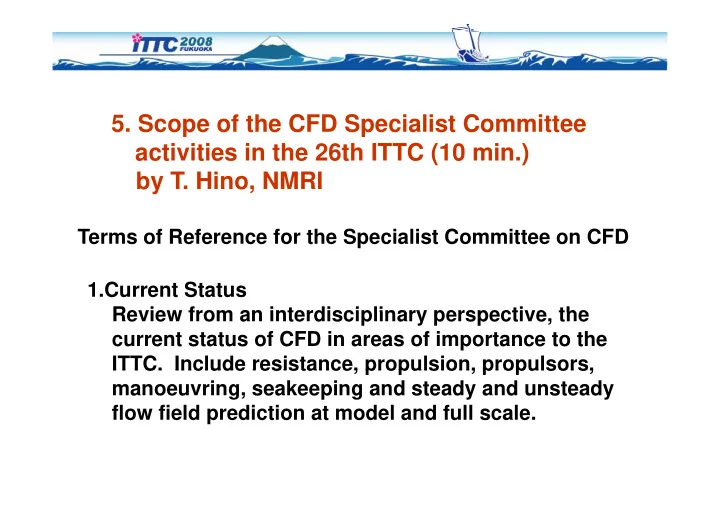

5. Scope of the CFD Specialist Committee activities in the 26th ITTC (10 min.) by T. Hino, NMRI Terms of Reference for the Specialist Committee on CFD 1.Current Status Review from an interdisciplinary perspective the Review from an interdisciplinary perspective, the current status of CFD in areas of importance to the ITTC. Include resistance, propulsion, propulsors, ITTC. Include resistance, propulsion, propulsors, manoeuvring, seakeeping and steady and unsteady flow field prediction at model and full scale.
2. Numerical Methods Review the relative merits of numerical methods of relevance to ship hydrodynamics: a. higher order descretization methods, pressure solvers, hi h d d ti ti th d l iterative solvers, time integration methods, immersed boundary methods, adaptive gridding methods boundary methods, adaptive gridding methods b. coordinate systems (Cartesian vs. curvilinear), structured/unstructured/particle methods, 6DOF solvers, dynamic overset grids. c. high performance computing such as profiling and metrics subroutine optimization scalability and metrics, subroutine optimization, scalability and parallel optimization, portability to new HPC architectures, and other HPC issues of relevance ship architectures, and other HPC issues of relevance ship hydrodynamics.
3. Modelling Identify the need for research in a. air/water interface treatment, unsteady flows, turbulence, environmental effects, structures integration, propulsors, thermal and salinity transport i t ti l th l d li it t t and surface roughness in full scale computation b. other modeling issues of relevance to ship b. other modeling issues of relevance to ship hydrodynamics. 4. Verification and Validation Review the development and implementation of verification and validation methodologies and verification and validation methodologies and procedures for CFD simulations and provide recommendations for their standardization and use in recommendations for their standardization and use in ship hydrodynamics.
5. Validation data Define which benchmark data are needed for CFD Define which benchmark data are needed for CFD validation. Include the requirements for experimental data. The ability to correlate full-scale computation y p with real ship data should also be considered. 6. CFD-based design 6 CFD b d d i The growing complexity of modern ships makes the use CFD increasingly attractive in the design phase use CFD increasingly attractive in the design phase. Review the impact of CFD on the design of modern hull forms through direct evaluations or through g g optimization methods and Simulation Based Design frameworks.
7. Computational Towing Tank Review the use of CFD in replacing standard towing tank design testing through simulations techniques k d i i h h i l i h i such as full curve resistance and self propulsion simulations and other such techniques that are unique simulations and other such techniques that are unique, efficient and not possible or highly difficult using a physical towing tank. p y g 8. Liaise with the organizing committee for the 2010 CFD workshop in Goteborg. ( Note: There have been initial k h i G t b ( N t Th h b i iti l discussions between the ITTC AC and Professor L. Larsson, Chalmers University of Technology, that the Larsson Chalmers University of Technology that the Specialist committee on CFD could be a reference group or discussion partner to the organizing g p p g g committee of the 2010 CFD workshop ).
Recommend
More recommend